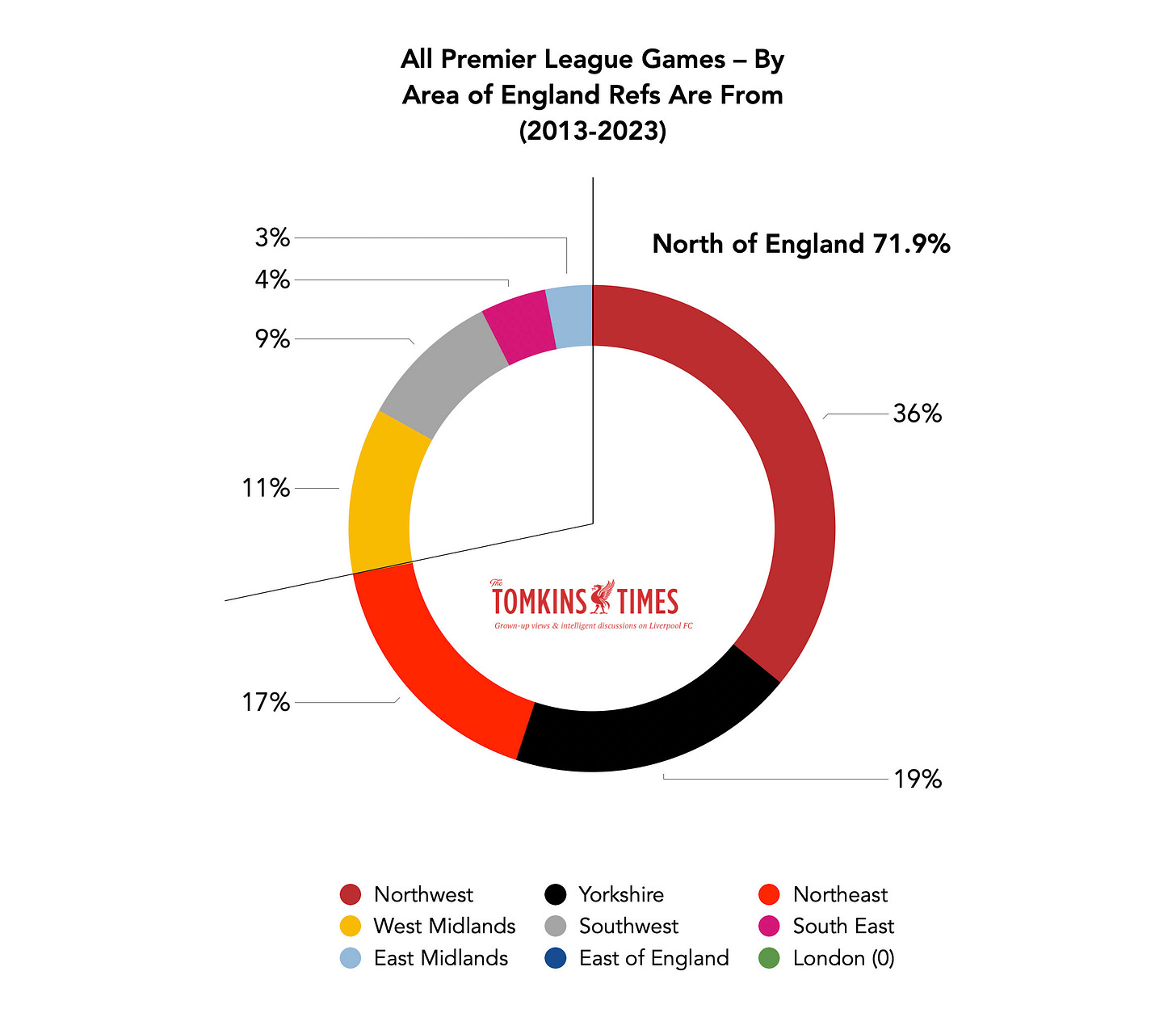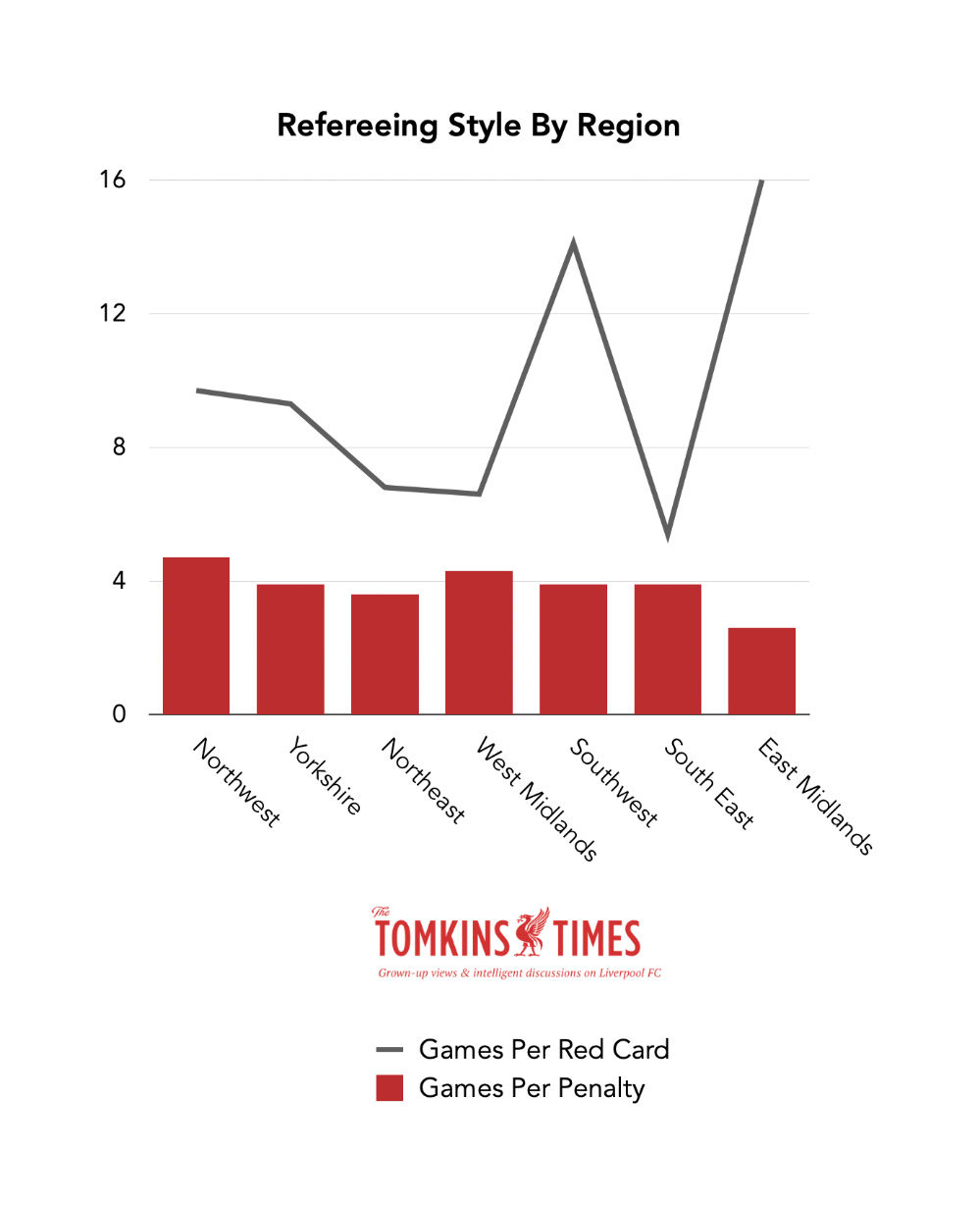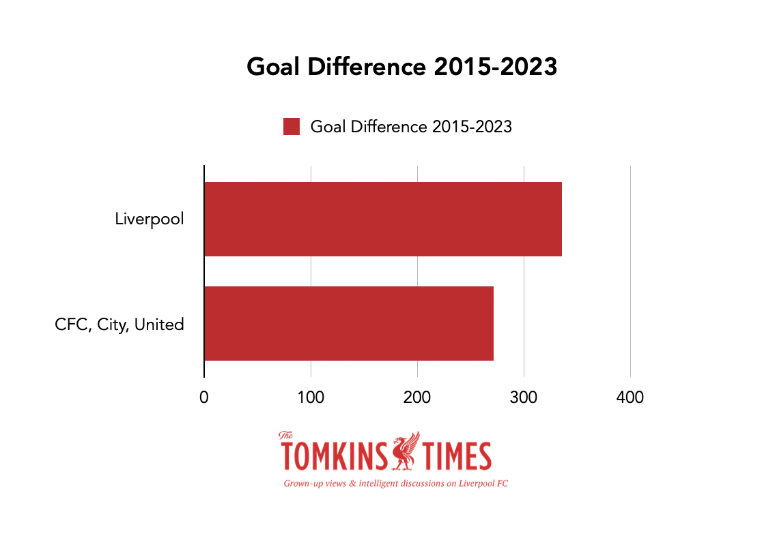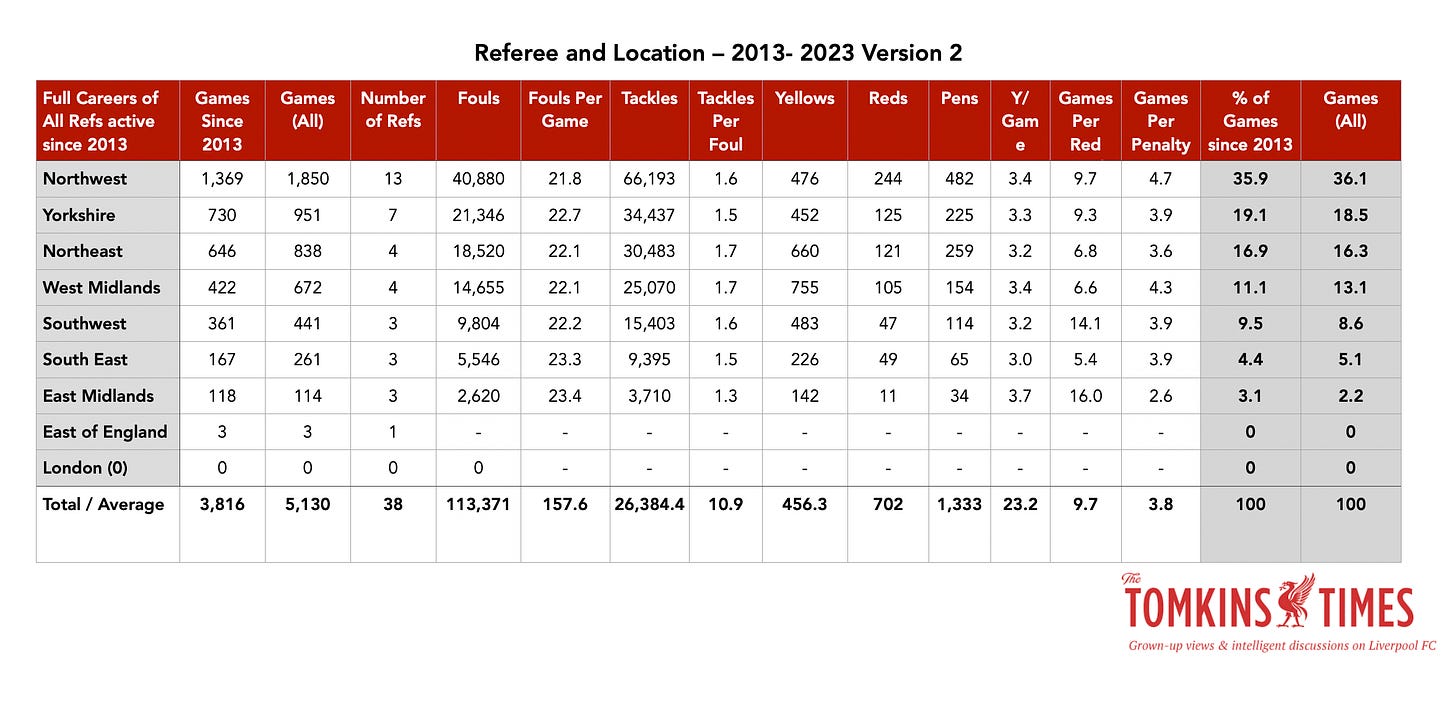The PGMOL – A Northern Old-Boys' Network? Shocking Stats All PL Fans Should See
Analysing – from deep in Hell – where refs are from and how it affects their decisions
Giving its topicality, I'm here again, parsing the data, as it appears that no one else does this stuff, and I have the databases (and I have nothing to do in Hell, as the devil roasts my toes and heats his poker).
(I'm sick of it, but continue to be shocked every time I delve into something different.)
When Mike Dean said that he didn't make an obvious call to spare his 'mate' Anthony Taylor, it merely confirmed many smart people's suspicions about how officials make decisions.
Namely, to help mates; to spare the blushes of the new guy; to appease the PGMOL; the get revenge on a rival ref they dislike; due to inattentional blindness and other failures to 'see' what their eyes show them, because they’re not trained in advanced thinking but with outdated ideas; because they bear grudges or are prejudiced against certain players or managers; because they've been told to be strong at an 'intimidating' ground or to an 'intimidating' figure; because they are harassed by people in the street (or online if they’re stupid enough to have social media), or cajoled and encouraged by mates down the pub or strangers in the supermarket; and also when they feel too lowly to intervene and overrule a superior officer.
Indeed, the last factor was a big part of aviation safety overhaul, when airliners repeatedly crashed because a junior pilot dare not undermine the captain. Now, a junior pilot must point out anything that is of concern. (In honour-based cultures this problem continued even longer.)
Matthew Syed's book 'Black Box Thinking' uses the aviation industry's generally exemplary self-examination to get to the truth, and (mostly) not to cover up, and how data is a key part of the process (to spot patterns); as well as understanding human dynamics, such as the one mentioned in the previous paragraph.
(The book is of extra interest to me as I grew up around aviation, adjacent to Heathrow; albeit my dad spent 40 years as a fairly low-level mechanic fixing aircraft, and nothing more fancy than that. I haven’t read this review of the book but it seems to explain it from the introduction.)
Officials also have biases, conscious or otherwise. I've repeatedly shown how 600+ Premier League penalties over a 7-season period saw refs show favouritism, based on % minutes played, to English players in both boxes. (I haven’t re-read the article but one on the old TTT site, which now exists as just an archive, can be found here.)
The internal politics and external optics make for a typical mess when it comes to secretive decision making, at an organisation that continues to lose credibility.
Mic-ing up Mike would have saved a lot of this strife.
But no, VARs must stay secretive. (At least the offside process has improved with margin for error built in, and I trust the software with the lines now drawn fairly straight, and not as if by some partially-sighted meth-head tripping his tits off.)
I grant that's not an easy job, to be a referee or a VAR, and presumably to run the show isn't easy either. But that doesn't mean things can be fudged (and it's very handsomely paid work; more than the average surgeon), and right now, it looks increasingly like an old boy's network.
While Dean's revelation is seen as making life harder for refs, all he did was to be honest and show how the sausage is made.
But no one wants to admit how the sausage is made.
The PGMOL then basically countered what Dean had himself admitted to, to show a kind of cognitive dissonance that only the worst organisations will double-down with.
(I’m still hoping that this is a spoof.)
And while it will fuel conspiracies, let's just look at the data.
My previous pieces have shown the weirdness of VAR, and how good mates are often paired together; and the conflicts of interest you'd get as a result.
(These days, police forces know, after years of fudging and cover-ups and corruption, that they cannot be trusted to investigate their own; so they pass it on to an independent force. That's human nature: we instinctively want to cover for our friends and not throw them under the bus, even if that’s where they belong. That's what Dean did for Taylor, and how often is that done each weekend? Never, according to the PGMOL, and hell, Dean didn't do it, either. It’s always good for an organisation to look like something mocked by George Orwell when seeking respect.)
While this piece still focuses on Liverpool FC, I also wanted to look at the makeup of the Premier League refereeing pool. (I don't have the energy or the will to go through VARs as well at this point, but maybe another time, if I don't go fully insane in the interim.)
And that may interest the neutral. (I shared the main graphic at the start of this piece.)
And again, this stuff continues to shock me, despite seeing some of the data before.
Andrew Beasley helped provide me with a list of the number of Premier League games reffed by each official since 2013 (and in other parts of this piece I'll use my own database of decisions, which references Transfermarkt's detailed data.)
Plus, I have the detailed decision data of each of those refs over the course of their full Premier League careers.
(To date, they have awarded 113,371 free-kicks and 1,333 penalties, FWIW.)
Northwest and Yorkshire
Mike Dean and Anthony Taylor are part of a shocking proliferation of northwest refs (13!), followed by Yorkshire refs (7).
Add the northeast, and virtually three-quarters of Premier League games (72%) in the past ten years (2013-2023) have been reffed by northern officials, from almost 4,000 fixtures.
Games done by refs from East of England? Three.
Games done by refs from London? Zero.
Where is the diversity, aside from ethnicities?
(Weirdly, even the sadly still-outlying black referee Uriah Rennie, is from Yorkshire!)
For some unfathomable reason (…) I'm all for helping out bald white guys in their early 50s, but it seems that being from the north of England helps to get you a gig at the PGMOL.
(And even Jonathan Moss, from Sunderland, has long been based in Yorkshire, where he taught a young James Milner, before later sending him off for Liverpool.)
Tyke!
Here's the thing. I've noted before that during the Jürgen Klopp era, Liverpool get far worse decisions from northwest refs compared to the rest of England.
But there's a group who are even worse: Yorkshire refs.
Still, it's a good job Yorkshiremen haven't had much influence in how the game is/was officiated, eh?
There's Mike Riley, the manager of the Professional Game Match Officials Limited (PGMOL) from 2009-2022. He's from Yorkshire.
Howard Webb, his replacement, is from Yorkshire.
(Their predecessor, Keith Hackett, is from ... Yorkshire. Hackett, who actually seems to talk some sense, replaced Philip Don, who is from ... Yorkshire.)
So basically, the heads of refereeing for decades have all been Yorkshiremen.
Is there a special chalice they pass from one to the other, or perhaps the Hallowed Whistle of Tyke, whittled from a piece of wood in 1893 by a man in a black kit.
Still, at least there's the Select Group of elite English referees these days. That sounds great!
"The Select Group is a panel of English professional football referees and assistant referees, appointed by Professional Game Match Officials Limited (PGMOL). The group was first formed in 2001, when England became the first country to use fully professional referees in its top flight."
Oh, so where is Yorkshireman Martin Atkinson now?
"Select Group 1 Coach."
(Atkinson's data for Liverpool radically changed almost overnight, after Klopp took charge and as soon as Steven Gerrard's book came out in 2015, lambasting the grumpy official; Atkinson went from a normal rate of decisions to an abnormally low rate of decisions – but it’s just a coincidence, of course.)
Where is Yorkshire-based Jonathan Moss now?
"Select Group 1 Manager."
What about Wayne Allison, the PGMOL Coaching Director. Where's he from?
Yorkshire.
Virtually every important position at the PGMOL is occupied by a man in his 50s from (or living in) Yorkshire, in addition to the 2nd-highest number of active referees in the past decade (Atkinson, Craig Pawson, Howard Webb, Bobby Madley, Andy Madley, Darren England, Thomas Bramall, and adoptive Yorkie, Moss).
Far be it from me to allege nepotism, cronyism, old-boys' networks, and so on.
I mean .... If only there were some evidence, some data, some patterns?
So even refs from Yorkshire who have been harsh on Liverpool are now working for the PGMOL.
Surely location diversity should be important?
That's before getting onto the bizarre proliferation of refs from the northwest, as if it and Yorkshire are the only footballing hotbeds in the UK.
Twenty of the 36 refs are from the northwest and Yorkshire (including Webb, who worked up to 2014, but excluding Riley, who had retired). Of the 20 refs to do over 100 games in the past decade, 14 are from the north of England.
How many more mates do Dean and Taylor have amongst the 13 northwest officials? How can we trust them to mark each other's homework? Simply, we cannot.
Over a third of the officials (11 of 31) to referee over 15 Premier League games in the past decade are from the northwest.
Of the five connected to Merseyside (including an Australian who lives there), none did/do Liverpool games; Mike Dean eventually relenting on the issue during the pandemic season (and giving the Reds just one Big Decision, but two against).
All of the Greater Manchester/Lancashire refs do both Manchester clubs.
All of Which I find fascinating, given the vastly varying styles of refereeing you get by location. (As well as how Liverpool are massively penalised by northwest and Yorkshire refs in particular.)
Games per penalty ranges from 2.6 to 4.7, so almost double; but games per red card range from one every 5.4 games to one every 16.0, with all sample sizes including at least 100 games.
(Not that Liverpool get help from the more generous referees.)
Liverpool also has a difficult history with Yorkshire since 1989, and their police in particular.
(Howard Webb was a police officer with South Yorkshire Police, of all police forces. I've only met one South Yorkshire policeman, 20 years ago, and he told me that of course the Liverpool fans were murderers; he was on duty that fateful day in 1989, but in another part of Sheffield. That's how institutional misinformation gets spread, by people who believe what they hear.)
Less than a quarter (23%) of England's population resides in the northwest and Yorkshire/Humber. Yet their refs take charge of 54.6% of Premier League games.
I never expect to see parity or equity in any data, as life doesn't even itself out to that degree, and to think it would is itself a form of madness; but that's a big discrepancy.
Nine million people live in London and they reffed not one Premier League game; while the East of England's 6.2m people accounted for three Premier League matches.
The population of London and the East of England equals that of the northwest, Yorkshire and the northeast combined; refs from the former officiated three matches, the latter 2,745.
If greater distance from a club means less likelihood of any kind of bias (for or against), then this is ever so slightly skewed - just the 915 games by a ref from the north for every one from London and the East of England.
I've said before that the closer to Liverpool a ref is from, the less he will give to the Reds. That shouldn't really happen. But people seem to think that who a ref supports is all that matters.
Regions and Massive Disparities in the Data
If you compare Liverpool's goal difference average with the combined averages of the three next-best clubs since 2015 (Man City, who have been better, and Man United and Chelsea, who have been worse), you get a goal difference – which usually correlates with Big Decisions over big sample sizes – of +336 for Liverpool, and an average of +272 for the other three.
As such, Liverpool, known for their exciting attacking football (and for several seasons, mean defending) have been 21.1% better than their combined rivals in both boxes.
That’s so good I’ll put in fancy-quote format:
Liverpool, known for their exciting attacking football (and for several seasons, mean defending) have been 21.1% better than their combined rivals in both boxes.
(Exclude penalties and the gap would be even wider. Points won = 635 Liverpool, 594 the average of the other three clubs.)
So, in the big sample sizes of eight years of games – over 300 in the league for each – you'd expect to see the usual trend for better clubs to be reflected in both sets of data.
After all, as I keep pointing out, a successful team can expect a balance of +4 Big Decisions per season; so, maybe three more penalties won than conceded, and one more opponent sent off.
Over eight years, you should then be looking at around +32 to +40 Big Decisions for each club.
Indeed, there were 115 'extra' Big Decisions FOR these four clubs than AGAINST them since 2015, at a balance rate of +1 every 8.4 games. (So, about 4.5 per club per season.)
Penalties favouring: 213
Penalties punishing: 107
Red cards favouring: 42
Red cards punishing: 33
2nd-Yellows favouring: 20
2nd-Yellows punishing: 18
The big difference is in the penalties, and that's where pitch-based dominance plays out; a red card can happen anywhere, but a penalty can only occur in either box. Penalties are simply far more common.
(Albeit regular mid-table clubs generally win more penalties than expected; clubs like Crystal Palace, Bournemouth, Leicester and Brighton tend to average winning more per season than Liverpool during the Klopp era. But that’s from another set of articles, and maybe also speaks to the safety of giving Big Decisions to mid-table clubs, albeit you’d expect struggling clubs to win fewer, which they do. The oddness is in how mid-table clubs win more than you’d otherwise expect.)
Of the +115 extra Big Decisions, +94 were racked up by the Reds' three rivals, at an average of +31.3 (or 0.11 per game).
Just +21 went to the Reds (or 0.07 per game), at a frequency lower by 36.7%, despite the more dominant average goal difference (over 20% better).
But it's the starkness in the contrast of who is making these Big Decisions that has alarmed me more than any other officiating data I've looked into. (Again, I may start betting on this stuff, as writing about it isn’t going to make me rich.)
Refs outside of the northwest and Yorkshire are slightly more generous to Liverpool than 'expected', but they are the ones whose data at least matches the shape expected.
Refs from the northwest and Yorkshire absolutely hammer Liverpool, especially in comparison to the three other clubs who, overall, have scored fewer goals, conceded more goals, won fewer games and won fewer points (when averaged into a trio).
The graphs are so alarming, that I wonder if it's time to give up football and go and do something else. Remember, the charts should more closely resemble the goal difference graphic.
In 86 games reffed by Yorkshire officials, the Reds have a negative balance, which is unfathomable. If they had given Liverpool an extra two Big Decisions, then it would go to +1, and then you could say that it’s 10x lower than the average of the other clubs.
Refs that clubs had problems with are frequently kept away. From an Athletic article from 2020:
“[Mark] Clattenburg went six years without being selected for a game at Goodison Park because of the fallout from a Merseyside derby in 2007 in which he sent off two Everton players and made several other calls in Liverpool’s favour.”
“... Moss knows about this, too. He went 20 months without a game at Leicester after they complained about his performance, featuring a red card to Jamie Vardy for diving, during a 2-2 draw with West Ham in their title-winning season. And never under-estimate the power of Sir Alex Ferguson’s voice during his many years as a fervent student of refereeing demonology. Martin Atkinson, one of the Premier League’s highest-ranked officials, had one eight-month spell without a game at Old Trafford, and another lasting a year, after various controversies involving Ferguson’s teams.”
Yet Paul Tierney and Constantine Hatzidakis were back involved in Liverpool games within no time at all.
Imagine if an official had elbowed one of Alex Ferguson's players?! That ref would be shining shoes from a shack in Outer Mongolia within 24 hours.
I googled the Dean incident and found this from John Cross in the Mirror, who blamed Dean, and defended Webb.
“That is the attitude - looking after your mates, not wanting to upset anyone, not treading on toes to get the right decision, not overruling a superior - that Webb has to eradicate to improve VAR. Sadly for Webb and the referees’ body the PGMOL, their task has probably got a lot harder after Dean’s comments. Because ultimately it is all about perception.
No, it’s what he actually did! 🤦♂️ He did that very thing and admitted to it.
He did the thing!
“This will have Wolves boss Gary O’Neil fuming. Because his Wolves team were denied a clear penalty at Manchester United when the VAR did not instruct the referee to have another look. Why didn’t the VAR act more strongly after Liverpool’s Alexis Mac Allister was sent off against Bournemouth last week? They had to wait to appeal - and then the red card was rightly overturned.”
Who was the VAR and his assistant?! Paul Tierney and Constantine Hatzidakis!
I mean, I don’t expect journalists to have a clue about facts, situations, histories; just opinions pulled right from their arse.
A brief reminder:
UPDATED: Detailed Analysis: The Alarming, Abnormal Data of Paul Tierney and Liverpool FC
Argh! I didn't want to have to do it (again); but the PGMOL essentially made me (again). Look What You Made Me Do. In general, I really don't like conspiracy theorists, albeit I also don't agree with those who deny all conspiracies, when like anything else in life, there are shades of grey; crazy examples (I won't name them), and common examples (myriad collusions), and everything in between.
Cross’ logic (or lack thereof) is astonishing.
If Tierney and Hatzidakis on co-duty on VAR (where they swiftly made a decision that Cross cannot explain) is the PGMOL's new solution to make things fairer and avoid conflicts of interest, they may as well have appointed the Bournemouth chairman as the VAR and Gary Neville as his assistant.
And why wasn't the decision at Old Trafford overturned? What was the VAR’s logic?
Cross is arguing that there is no problem anymore (because Webb has sorted things out), and is then giving examples of the same kind of logically inexplicable 'decisions' that Dean's admitted failing explains; all within the first week or so of the new season.
To attack Dean for admitting how officials actually think and act – the 'corrupting' pressures they face – is so crass. Even if it was dumb for Dean to admit it in one sense (rule one: never show how the sausage is mede), any time that someone shows how 'corruption' works (in this case, favouritism/nepotism, and turning a blind eye), it should be a cause to salute whistleblowing (of another kind).
I see an institutional problem with the PGMOL, and I don't think people like me are going to solve it. I have no beef with the generally fine people of Yorkshire, but I don’t see why the run the officiating of the English game, with an excess of northwestern refs too.
I can just highlight the data, the apparent cronyism, and see what happens, as the devil twirls the red-hot poker and beckons me over.
My bias is towards Liverpool, of course, but the data is the data.
Still, maybe the Saudis will buy the PGMOL too (they've already paid the hitherto likeable Michael Oliver, a Newcastle fanatic, a big fee to ref over there; but hey, Webb is doing a good job with perceptions, right, Crossy? No potential conflict of interest there).
Then we can finally bin this charade, and can all just fuck off and do something else.
Don’t bother subscribing via the button below, I’m off to shine shoes in a shack in Outer Mongolia before the Devil catches me.
No, really. Don’t subscribe. It’ll only make things worse.
I SAID DON’T SUBSCRIBE! WHY DOES NO ONE LISTEN TO ME?!
Keep reading with a 7-day free trial
Subscribe to The Tomkins Times - Main Hub to keep reading this post and get 7 days of free access to the full post archives.









